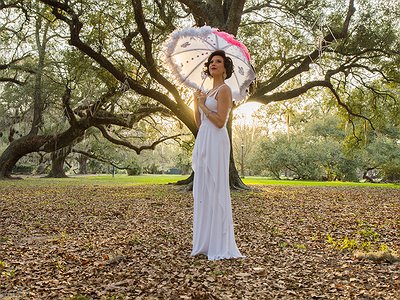Name: Lisette Oropesa
Nationality: Cuban American
Occupation: Singer
Current Release: Aux Filles du Désert, available on bandcamp
Recommendations: My favorite book of all time is "East of Eden" by John Steinbeck. My favorite piece of music is impossible to choose but I think something beautiful to listen to is the "St. Matthew Passion" by J.S. BACH.
Website / Contact: If you enjoyed this interview with Lisette Oropesa, visit her excellent website, which offers biographical information, music and up to date tour dates.
When did you start singing, and what or who were your early passions and influences? What what is about music and/or sound that drew you to it?
I started singing as a very small child. I come from a musical family so it was the first way I learned to express myself. My mom is a professional singer, and my sisters, aunts and grandfather are also especially gifted, so I got a lot of wonderful influence from a harmonious (literally!) family.
For most artists, originality is first preceded by a phase of learning and, often, emulating others. What was this like for you?
I spent a lot of my early years copying and imitating what my mother sounded like. She has the most beautiful voice in the world so I did my best to sound like that. But then as the years went by and I started singing professionally away from home a lot, and my voice began to change and develop, I started to let it take on its own characteristics naturally. I have learned a lot about technique over my years of study and as long as I’m singing correctly, my voice will take on whatever colors it wants. It’s weird because even though it’s my voice, it really is its own entity. We singers have to respect that, because the voice doesn’t always do what we may want it to do. One can control how she uses it and she must take care of it, but in the end, it will sound however that specific, unique instrument sounds, and there’s not a lot one can do to change it. So best to be happy with it and let it ring!
What were some of your main artistic challenges when starting out as an artist and in which way have they changed over the years?
I have always been good at practicing efficiently and that has gotten better over the years. But at first I was not so disciplined about exercise and diet. Now I am much more diligent about my schedule and I block out time for exercise which is non-negotiable. It helps me work better throughout the day, and sleep better at night, and it sharpens my mind. I also follow a vegan diet which has kept me thriving in excellent health. I know I sound like a salesman but it’s the truth.
Tell us about your studio/work space, please. What were criteria when setting it up and how does this environment influence the creative process? How important, relatively speaking, are factors like mood, ergonomics, haptics and technology for you?
Well, because I travel so much I have to get used to working in very different environments. Sometimes work can get done on the plane or in a coffee shop, and other times you really need a piano, privacy, and some peace and quiet. I love to have at least a keyboard of some kind to help me learn music but sometimes have to rely on my iphone for pitches! This constant change of set-up has helped me become more efficient; I practice in my mind quietly sometimes, or on the train. It varies. I use technology minimally. Only for a dictionary if I need it, and once in a while a recording to get my bearings. But generally I’m a score + pencil + staff paper + piano + water type.
Tell me about your relationship with your voice, please. What are its most important qualities and how do they influence the musical results?
I suppose voice type is the place to start, as it’s the major thing I cannot control. I’m a lyric-coloratura. I am happy that my voice is what it is, and I don’t wish it was anything else. When I was younger I wished it sat higher, but now I’m glad it doesn’t actually, because as I’m growing, I’m able to sing many more roles comfortably. Musically those roles tend to fall to young, romantic, comic, or sometimes tragic characters. So I’m lucky that there is a lot out there for me. I do feel there is room for growth though, so ideally as I age away from those roles, my voice will meet me in more lyric repertoire. But I don’t think I’ll ever be a dramatic soprano.
Could you take us through a day in your life, from a possible morning routine through to your work? Do you have a fixed schedule? How do music and other aspects of your life feed back into each other - do you separate them or instead try to make them blend seamlessly?
I try to make time every day for work, and time for play. That way I don’t feel overworked or lazy. My schedule is absolutely different every single day so the biggest challenge for me is finding a routine. Travel can be a big body stressor and I have noticed that the more I do it, the better I can prepare. But there are other things which have gotten harder. For example, it takes me longer to warm up my voice now than it did in my 20s. But my stamina is twice as long and my middle and low registers feel more comfortable. Jet lag is absolutely something I deal with and I have to be careful because it can take a toll on the voice. If I take the right precautions it can be easier but I have never NOT had jet lag.
As far as other aspects, my husband is always with me as he ties his work into mine, so I am extremely happy to be able to have my life partner with me. We run together, hike, cook, go shopping … he is wonderful.
Could you describe your creative process on the basis of a piece, performance or album that's particularly dear to you, please?
Well learning a new role is an amazing balance of discipline and creativity. Because it’s already been written I can’t do much inventing and have to stick to the score at first. But as I begin to rehearse and become part of a live performance, for a director’s vision, then I can tap into other aspects of the art form, like acting. Every director wants something different and every conductor also wants to put his or her mark on a piece of music. It’s up to me to interpret those visions and make them organic for me. It’s an amazing process and one that I love dearly. We are never bored!



